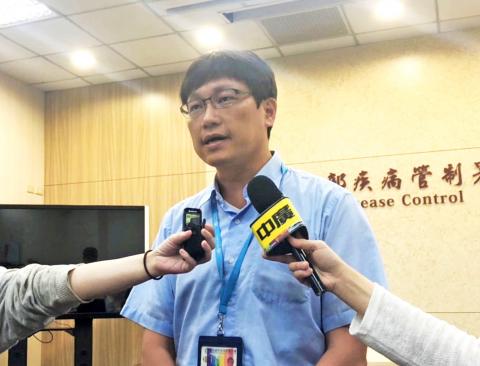The Centers for Disease Control (CDC) on Friday confirmed this year’s first Japanese encephalitis case, urging people to take precautionary measures against mosquito bites as the disease’s peak season approaches.
A man in his 60s from Kaohsiung on May 1 started showing symptoms of fever, headache, convulsions and loss of consciousness, and was immediately hospitalized, the centers said.
He was reported as a suspected case and transferred to another hospital for further treatment on May 5, with test results on Friday confirming that he was infected with Japanese encephalitis, it said.

Photo: CNA
He has since slipped into a coma and is being treated at an intensive care unit, the CDC said.
The man had visited a friend in Kaohsiung’s Daliao District (大寮) and a natural recreational area in Fengshan District (鳳山) during the incubation period, CDC physician Lin Yung-ching (林詠青) said, adding that there is a pig farm and meat market as well as rice paddies near the places he visited, so he might have been infected there.
The Japanese encephalitis season lasts from May to October, with June and July the peak period, Lin said.
Most people show mild to no symptoms at all, but in some cases the patient might develop a headache, fever or aseptic meningitis, which could progress to loss of consciousness, seizures and ultimately death, he said.
About 30 to 50 percent of those who survive the serious symptoms are left with permanent brain damage, muscle weakness, learning difficulties or personality changes, Lin said, adding that young children, elderly people and people with weak immune systems are at higher risk of developing serious symptoms.
Getting vaccinated is the best prevention method, the CDC said, urging parents to have children above 15 months to get vaccinated at local health departments or contracted hospitals.
People should avoid rice paddies, ponds, trenches, animal farms and other places mosquitoes inhabit, especially at dawn and dusk, when they are most active, and take protective measures against mosquito bites when going outdoors, the CDC said.

ANOTHER EMERGES: The CWA yesterday said this year’s fourth storm of the typhoon season had formed in the South China Sea, but was not expected to affect Taiwan Tropical Storm Gaemi has intensified slightly as it heads toward Taiwan, where it is expected to affect the country in the coming days, the Central Weather Administration (CWA) said yesterday. As of 8am yesterday, the 120km-radius storm was 800km southeast of Oluanpi (鵝鑾鼻), Taiwan’s southernmost tip, moving at 9kph northwest, the agency said. A sea warning for Gaemi could be issued tonight at the earliest, it said, adding that the storm is projected to be closest to Taiwan on Wednesday or Thursday. Gaemi’s potential effect on Taiwan remains unclear, as that would depend on its direction, radius and intensity, forecasters said. Former Weather Forecast

As COVID-19 cases in Japan have been increasing for 10 consecutive weeks, people should get vaccinated before visiting the nation, the Centers for Disease Control (CDC) said. The centers reported 773 hospitalizations and 124 deaths related to COVID-19 in Taiwan last week. CDC Epidemic Intelligence Center Director Guo Hung-wei (郭宏偉) on Tuesday said the number of weekly COVID-19 cases reported in Japan has been increasing since mid-May and surpassed 55,000 cases from July 8 to July 14. The average number of COVID-19 patients at Japan’s healthcare facilities that week was also 1.39 times that of the week before and KP.3 is the dominant

The Chinese Communist Party’s (CCP) working group for Taiwan-related policies is likely to be upgraded to a committee-level body, a report commissioned by the Mainland Affairs Council (MAC) said. As Chinese President Xi Jinping (習近平) is increasingly likely to upgrade the CCP’s Central Leading Group for Taiwan Affairs, Taiwanese authorities should prepare by researching Xi and the CCP, the report said. At the third plenary session of the 20th Central Committee of the CCP, which ended on Thursday last week, the party set a target of 2029 for the completion of some tasks, meaning that Xi is likely preparing to

US-CHINA TRADE DISPUTE: Despite Beijing’s offer of preferential treatment, the lure of China has dimmed as Taiwanese and international investors move out Japan and the US have become the favored destinations for Taiwanese graduates as China’s attraction has waned over the years, the Ministry of Labor said. According to the ministry’s latest income and employment advisory published this month, 3,215 Taiwanese university graduates from the class of 2020 went to Japan, surpassing for the first time the 2,881 graduates who went to China. A total of 2,300 graduates from the class of 2021 went to the US, compared with the 2,262 who went to China, the document showed. The trend continued for the class of 2023, of whom 1,460 went to Japan, 1,334 went to